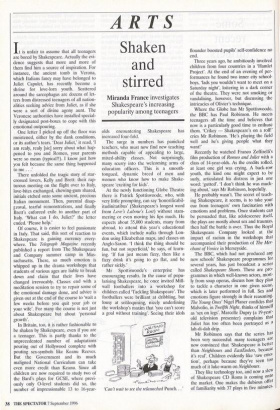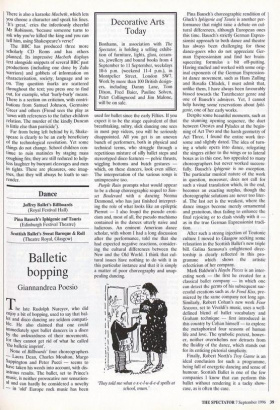ARTS
Shaken and stirred
Miranda France investigates Shakespeare's increasing popularity among teenagers It is unfair to assume that all teenagers are bored by Shakespeare. Actually the evi- dence suggests that more and more of them find him a source of inspiration. For instance, the ancient tomb in Verona, which Italians fancy may have belonged to Juliet Capulet, has recently become a shrine for love-lorn youth. Scattered around the sarcophagus are dozens of let- ters from distressed teenagers of all nation- alities seeking advice from Juliet, as if she were a sort of divine agony aunt. The Veronese authorities have installed special- ly designated post-boxes to cope with this emotional outpouring.
One letter I picked up off the floor was moistened, either by the dank conditions, or its author's tears. 'Dear Juliet,' it read, 'I am realy, realy [sic] sorry about what hap- pened to you and Romeo, your parents were so mean (typical!!). I know just how you felt because the same thing happened to me ...'
There unfolded the tragic story of star- crossed lovers, Kelly and Brett: their rap- turous meeting on the flight over to Italy, love-bites exchanged, chewing-gum shared, initials etched onto some ancient, precious Italian monument. Then, parental disap- proval, tearful remonstrations, and finally Brett's enforced exile to another part of Italy. 'What can I do, Juliet?' the letter ended. 'Please help.'
Of course, it is easier to feel passionate in Italy. That said, this sort of reaction to Shakespeare is gaining currency every- where. The Telegraph Magazine recently published a report from The Shakespeare and Company summer camp in Mas- sachusetts. There, so much emotion is whipped up in the drama workshops that students of various ages are liable to break down and claim that their lives have changed irrevocably. Classes end with a meditation session to try to repair some of the emotional damage done, and advice is given out at the end of the course to 'wait a few weeks before you quit your job or your wife'. For many the course is not just about Shakespeare but about 'personal growth'.
In Britain, too, it is rather fashionable to be shaken by Shakespeare, even if you are a teenager. This is partly thanks to the unprecedented number of adaptations pouring out of Hollywood complete with pouting sex-symbols like Keanu Reeves. But the Government and its much maligned National Curriculum can take even more credit than Keanu. Since all children are now required to study two of the Bard's plays for GCSE, where previ- ously only 0-level students did so, the number of impressionable 13 to 16-year- olds encountering Shakespeare has increased four-fold.
The surge in numbers has panicked teachers, who must now find new teaching methods capable of appealing to large, mixed-ability classes. Not surprisingly, many scurry into the welcoming arms of education officers. This is a smooth- tongued, dynamic breed of men and women who know how to make Shake- speare 'exciting for kids'.
At the newly functioning Globe Theatre there is Patrick Spottiswoode, who, with very little prompting, can say `honorificabil- itudinitatibus' (Shakespeare's longest word from Love's Labour's Lost) without stam- mering or even moving his lips much. He expects about 35,000 students, many from abroad, to attend this year's educational events, which include walks through Lon- don using Elizabethan maps, and classes on Anglo-Saxon. `I think the thing should be fun, but not superficial,' he says, of learn- ing. 'If fun just means fizzy, then like a fizzy drink it's going to go flat, and be rather sickly.'
Mr Spottiswoode's enterprise has encouraging results. In the cause of popu- larising Shakespeare, he once invited Mill- wall footballers into a workshop for children called 'Tackling Shakespeare'. The footballers were brilliant at dribbling, but lousy at soliloquising, nicely underlining the workshop's maxim that 'you can't score a goal without training'. Seeing their idols 'Can't wait to see the relaunched Punch...' flounder boosted pupils' self-confidence no end.
Three years ago, he ambitiously involved children from four countries in a 'Hamlet Project'. At the end of an evening of per- formances he found two inner city school- boys, 'lads you wouldn't want to meet on a Saturday night', loitering in a dark corner of the theatre. They were not smoking or vandalising, however, but discussing the intricacies of Olivier's technique.
Where the Globe has Mr Spottiswoode, the BBC has Paul Robinson. He meets teenagers all the time and believes that now is a particularly good time to enthuse them. `Crikey — Shakespeare's on a roll!' cries Mr Robinson. 'He's playing the field well and he's giving people what they want!'
Recently he watched Franco Zeffirelli's film production of Romeo and Juliet with a class of 14-year-olds. As the credits rolled, at least one girl was crying. A back-row youth, the kind one might expect to be surly, articulated his distress in just one word: 'gutted'. 'I don't think he was muck- ing about,' says Mr Robinson, hopefully.
He probably wasn't. The secret of teach- ing Shakespeare, it seems, is to take your cue from teenagers' own fascination with emotions and problems. Once students can be persuaded that, like adolescence itself, the plays are mostly about sex and traumas, then half the battle is over. Thus the Royal Shakespeare Company looked at the impact of racism in the workshops that accompanied their production of The Mer- chant of Venice in Merseyside.
The BBC, which had not produced any new schools' Shakespeare programmes for several years, has just broadcast a series called Shakespeare Shorts. These are pro- grammes in which well-known actors, most- ly from soap operas, discuss how they plan to tackle a character in one given scene, which is later performed in full. Sex and emotions figure strongly in their reasoning. The Young Ones' Nigel Planer confides that Malvolio, in Twelfth Night, thinks of himself as 'sex on legs'. Marcelle Dupry (a 19-year- old television presenter) complains that Juliet has too often been portrayed as a lah-di-dah drip. Mr Robinson says that the series has been very successful: many teenagers arc now convinced that 'Shakespeare is better than Neighbours and EastEnders, because it's real'. Children evidently like 'raw emo- tion', perhaps because they've seen too much of it luke-warm on Neighbours.
They like technology too, and now a slew of Shakespeare CD Roms is coming onto the market. One makes the dubious offer of familiarity with 37 plays in five minutes.
There is also a karaoke Macbeth, which lets You choose a character and speak his lines. `It's great,' cries the infectiously cheerful Mr Robinson, 'because someone turns to ask why you've killed the king and you can tell him, using Shakespeare's verse!'
The BBC has produced three more scholarly CD Rams and has others planned. Its impressive Macbeth displays text alongside snippets of several BBC past Productions (including one done by Zulu warriors) and gobbets of information on characterisation, society, language and so on. Tiny question marks are scattered throughout the text; you press one to find out, for example, what 'hurly-burly' means. There is a section on criticism, with contri- butions from Samuel Johnson, Germaine Greer and others (Freud sees the play as 'sown with references to the father-children relation. The murder of the kindly Duncan is little else than parricide').
Far from being left behind by it, Shake- speare is clearly to be an early beneficiary of the technological revolution. Yet some things do not change. School children con- tinue to ruin matinees by staging mass coughing fits; they are still reduced to help- less laughter by buoyant cleavages and men in tights. These are pleasures, one imag- ines, that they will always be loath to sur- render.



























































 Previous page
Previous page